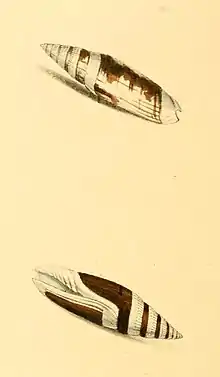
MITRA casta.
Chesnut-banded Mitre.
Generic Character.—See Pl. 23.
Specific Character.
- Mitra (Div. 3.) testâ albâ, lævi, olivæformi, spirâ aperturâ breviore, anfractibus supra tenuiter reticulatis, basi epidermide castaneam fasciam formante, in anfractu basali centralem et latam.
- Shell white, smooth, olive-formed, spire shorter than the aperture, the volutions finely reticulated above, the lower half with the epidermis forming a chesnut band which is central and broad on the basal whorl.
- Voluta casta. Chemnitz 10, p. 138, vig. 20 C D.—figura mala.
- Martyn Univ. Conch. i. tab. 20.
- Dillwyn Catalogue, vol. i. p. 554, no. 127.
All the writers I have been able to consult, uniformly describe this species as having a coloured band on the white ground of the shell. In the Banksian cabinet are two fine specimens, and which have enabled me to ascertain that this brown band is nothing more than an epidermis, or external coating, with which the shell is only partially covered—a circumstance of very rare occurrence; and which, being removed, proves the real colour of the shell to be of a uniform polished white. This, together with its excessive rarity, and the opportunity of giving original figures, has induced me to include it in this work, although it exists both in those of Martini and Martyn above quoted. I have neither seen nor heard of specimens being in any other collection, besides the two above noticed; and which no doubt were collected by their late lamented possessor on some of the South Sea islands. A striking affinity exists between this and M. zonata figured at the third plate of this work.
MITRA olivæformis.
Olive-shaped Mitre.
- M. testâ olivæformi, glabrâ, nitidâ, spirâ brevissimâ, longitudinaliter rugatâ, striâ centrali transversâ; columella 4-plicata.
- M. Shell olive-shaped, smooth, polished, spire very short, longitudinally wrinkled, with a central transverse stria, pillar four-plaited.
I introduce the description of this diminutive and undescribed shell from its affinity with the last, and as forming a most interesting transition from the Mitres to the Olives: agreeing with the former in the structure of the pillar and the sculptured spire, and with the latter in its general form and prima facie appearance. Its perfect resemblance, in fact, to a small olive, may have occasioned its being hitherto overlooked. The spire is slightly wrinkled and striated; the teeth on the pillar very near each other, slender, and four in number. The colour pale yellowish; the mouth darker, and the tip and base purple. The whole shell is scarcely half an inch long.
It was received from the South Seas.